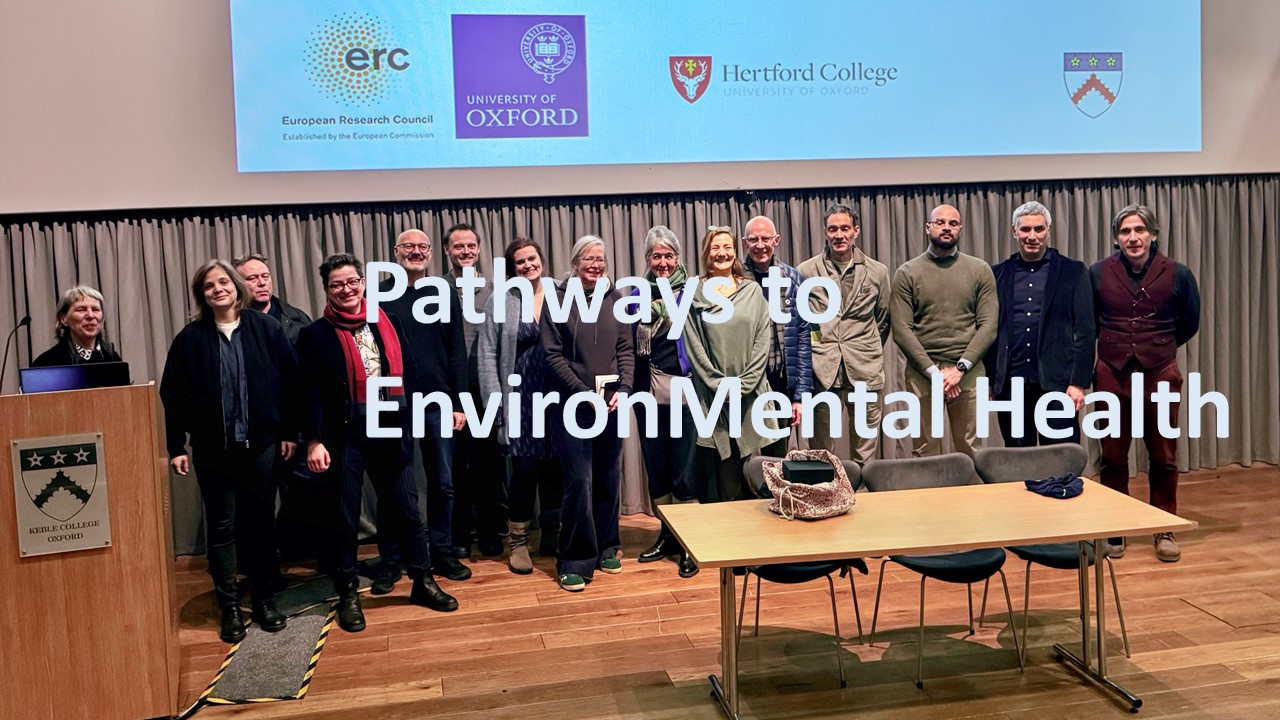Pathways to EnvironMental Health symposium
“Pathways to EnvironMental Health” symposium, 25-26 January 2025, Keble College, Oxford (O’Reilly Theatre).

The Pathways to EnvironMental Health symposium brought together interdisciplinary researchers and practitioners to explore the intersections of materiality, cognition, and mental health. The workshop was organised by Prof Lambros Malafouris in the context of the HANDMADE project which is funded by the European Research Council (ERC) under the European Union’s Horizon 2020 research and innovation programme (No. 771997). Hosted at Keble College, University of Oxford, the event featured diverse discussions spanning cognitive archaeology, anthropology, philosophy, psychology, psychiatry, design, art, architecture, museum studies and digital technologies, fostering new perspectives on the relationship between material engagement and mental well-being.
Lambros Malafouris (University of Oxford) opened the symposium introducing EnvironMentalism, advocating for a transactional view of mental health that cut across the traditional brain–body–world divisions. This theme resonated throughout discussions on computational psychiatry’s response to bioreductionist challenges by Axel Constant (University of Sussex), while Joel Krueger (University of Exeter) examined AI’s role in affective ecologies, particularly in dementia care. Frédéric Vallée-Tourangeau (Kingston University) and Paul March (University of Oxford) delved into issues of creative cognition, emphasizing the felt experience of extended mental states. Interdisciplinary insights enriched the symposium, with architects Jason Danziger (thinkbuild architecture) and psychiatrist Martin Voss (Charité University Hospital) presenting a case study on Soteria Berlin, emphasizing therapeutic design. The final session explored the role of museums and digital culture in mental well-being, with Christopher Morton (University of Oxford), Rebecca Sheriff (University of Oxford), and Thomas Kador (University College London) presenting research on the cognitive and emotional impact of material engagement in cultural spaces and discussing museums as therapeutic environments of care.
The second day began with Ilina Singh (University of Oxford) discussing Ecological-Collective-Flourishing, proposing a novel framework for integrating human and environmental well-being. Kristina Niedderer (Manchester Metropolitan University) addressed the significance of materiality and mindfulness in therapy, while Helen Jury (University College London) demonstrated art psychotherapy’s unique potential. Sessions throughout the day explored interdisciplinary methodologies. Discussions extended to sensory experiences, embodied participation, and clinical practice. Wendy Ross (London Metropolitan University) and Steven D. Brown (Nottingham Trent University) investigated variations in environmental responses and sexuality in psychiatric care, while Roger Kneebone (Imperial College London) explored the materiality of clinical performing focusing on the role of the computer in consultation practices. Carey Jewitt (University College London) and Minna Nygren (University College London) discussed how digital technologies reshape embodied communication and cooperative play.
Overall, the symposium underscored the importance of rethinking mental health beyond the individual, advocating for an integrative approach that recognizes the embedded, embodied, and extended nature of human cognition and well-being. The symposium concluded with a lively discussion on the future of EnvironMental health, reinforcing the need for integrative, interdisciplinary approaches to understanding and enhancing mental well-being through material engagement.
Symposium participants: Axel Constant (University of Sussex), Carey Jewitt (University College London), Christopher Morton (University of Oxford), Evangelos Skoupas (University of Oxford), Frédéric Vallée-Tourangeau (Kingston University), Helen Jury (University College London), Holly Fairgrieve (University of Oxford), Ilina Singh (University of Oxford), Jason Danziger (thinkbuild architecture), Joel Krueger (University of Exeter), Katrin Wilhelm (University of Oxford), Kristina Niedderer (Manchester Metropolitan University), Lambros Malafouris (University of Oxford), Martin Voss (Charité University Hospital), Maria Danae Koukouti (University of Oxford), Miranda Creswell (University of Oxford), Minna O. Nygren (University College London), Paul March (University of Oxford), Rebecca Sheriff (University of Oxford), Roger Kneebone (Imperial College London), Rory Carnegie (University of Oxford), Steven D. Brown (Nottingham Trent University), Thomas Kador (University College London), Wendy Ross (London Metropolitan University).
Image Caption: Pathways to EnvironMental Health participants (from left to right): Carey Jewitt, Minna Nygren, Steven Brown, Katrin Wilhelm, Martin Voss, Thomas Kador, Wendy Ross, Miranda Creswell, Helen Jury, Maria Danae Koukouti, Roger Kneebone, Paul March, Axel Constant, Jason Danziger, Lambros Malafouris.



